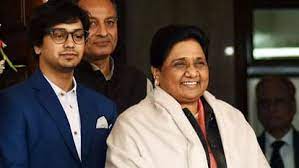
Amit Pandey
The Bahujan Samaj Party (BSP), founded by the late Kanshi Ram, was once a formidable force in Uttar Pradesh, the most populous and politically influential state in India. The BSP championed the cause of the Dalits, the lowest caste in the Hindu hierarchy, who have faced centuries of oppression and discrimination. Under the leadership of Kanshi Ram and his protégé Mayawati, the BSP managed to mobilise the Dalit vote and form the government in UP four times, with Mayawati becoming the first Dalit woman chief minister of any Indian state.
However, in the last decade, the BSP has seen a steady decline in its popularity and performance, losing ground to its rivals such as the Samajwadi Party (SP), the Bharatiya Janata Party (BJP) and the Congress. Many of its leaders, workers and supporters have deserted the party, accusing Mayawati of being autocratic, corrupt and aloof from the grassroots. The BSP, which once claimed to represent the interests of the Bahujans, or the majority of the oppressed classes, has failed to expand its base beyond the Dalits and to forge alliances with other social groups. The BSP has also been unable to counter the aggressive Hindutva agenda of the BJP, which has wooed a section of the Dalit voters with its religious and nationalist rhetoric.
The rise and fall of the BSP can be traced to the contrasting personalities and strategies of Kanshi Ram and Mayawati. Kanshi Ram, who was born in a Dalit family in Punjab, was a visionary and a charismatic leader who dedicated his life to the emancipation of the Dalits. He started his career as a government employee and later founded several organisations to unite and educate the Dalits about their rights and dignity. He launched the BSP in 1984 with the slogan of “Jiski jitni sankhya bhari, uski utni hissedari” (proportional representation for all according to their population). He also coined the term “Bahujan”, which included not only the Dalits, but also the Other Backward Classes (OBCs), the religious minorities and the lower castes among the upper castes. He aimed to create a social and political revolution by overthrowing the dominance of the upper castes, whom he called “Manuwadis” (followers of the ancient lawgiver Manu, who codified the caste system).
Kanshi Ram was a master of realpolitik, who understood the dynamics of caste and coalition politics in UP. He forged alliances with various parties and leaders, such as the SP, the BJP and the Congress, at different times, to gain power and influence. He also groomed Mayawati, a young Dalit woman from a humble background, as his successor and gave her the opportunity to become the chief minister of UP thrice, in 1995, 1997 and 2002, albeit for short periods. He wanted to create a model of Dalit empowerment and governance that would inspire and attract the masses.
However, Kanshi Ram’s health deteriorated in the early 2000s and he became bedridden. He handed over the reins of the party to Mayawati, who became the undisputed leader of the BSP. Mayawati, who had a strong personality and a loyal following among the Dalits, especially the women, consolidated her position by sidelining or expelling any potential rivals or dissenters within the party. She also adopted a different strategy from Kanshi Ram, who had focused on building a broad-based social coalition of the Bahujans. She decided to woo the upper castes, especially the Brahmins, who had traditionally been the adversaries of the Dalits. She coined the slogan of “Sarvajan Hitay, Sarvajan Sukhay” (welfare and happiness for all), and gave tickets and positions to many Brahmins and other upper castes in the party and the government. She also erected statues and parks in the name of Dalit icons, such as Ambedkar, Kanshi Ram and herself, spending huge amounts of public money.
Mayawati’s strategy paid off in the 2007 assembly elections, when the BSP won a clear majority in the UP assembly, with 206 seats out of 403. It was the first time that a single party had won a majority in UP since 1991, and the first time that the BSP had formed a government on its own. Mayawati became the chief minister of UP for the fourth time, and the first time for a full term of five years. She also harboured ambitions of becoming the prime minister of India, and projected herself as a national leader of the Dalits and the Bahujans.
However, Mayawati’s success was short-lived, as she soon faced a backlash from her core constituency of the Dalits, as well as from other social groups. The Dalits felt betrayed and alienated by her overtures to the upper castes, who they felt were still oppressing and exploiting them. They also resented her lavish lifestyle and corruption charges, which contrasted with her humble origins and professed commitment to the Dalit cause. The upper castes, on the other hand, did not remain loyal to her, and switched their allegiance to other parties, such as the BJP and the Congress, who offered them more benefits and representation. The OBCs and the Muslims, who had been the allies of the BSP in the past, also drifted away from her, and moved towards the SP and the Congress, who promised them more welfare and security.
The decline of the BSP became evident in the 2012 assembly elections, when the party lost power to the SP, which won 224 seats, while the BSP was reduced to 80 seats. The BSP also performed poorly in the 2014 Lok Sabha elections, when it failed to win a single seat out of the 80 in UP, while the BJP swept the state with 71 seats. The BSP’s downfall continued in the 2017 assembly elections, when it won only 19 seats, while the BJP won a landslide victory with 312 seats. The BSP also lost its status as a national party, as it did not meet the criteria of having at least 6% of the vote share in four states or having at least four seats in the Lok Sabha.
The BSP has been struggling to revive its fortunes since then, but has not been able to regain its lost ground or relevance. Mayawati has tried to forge alliances with other parties, such as the SP, the Rashtriya Lok Dal (RLD) and the Congress, but these have not yielded any positive results. The BSP’s alliance with the SP and the RLD in the 2019 Lok Sabha elections was a flop, as the alliance won only 15 seats, while the BJP retained its dominance with 62 seats. The BSP’s alliance with the Congress in the 2021 assembly elections in Punjab, Uttarakhand and Goa also did not make any impact, as the alliance failed to win any seat in these states.
The BSP is now facing an existential crisis, as it has lost its appeal and credibility among the voters, especially the Dalits, who have been its core support base. The BSP has also been unable to counter the challenge posed by the BJP, which has been making inroads into the Dalit vote bank by using various schemes, such as the Ujjwala Yojana, the Jan Dhan Yojana, the Swachh Bharat Abhiyan and the Pradhan Mantri Awas Yojana, to woo them. The BJP has also been projecting itself as a champion of the Dalit cause, by nominating Dalit leaders, such as Ram Nath Kovind and Om Birla, as the president and the speaker of India, respectively, and by celebrating the birth anniversaries of Dalit icons, such as Ambedkar and Ravidas, with pomp and show. The BJP has also been exploiting the fissures and divisions among the Dalits, who are not a homogenous group, but are divided into various sub-castes, such as the Jatavs, the Pasis, the Valmikis, the Khatiks and the Balmikis, who have different aspirations and grievances. The BJP has been trying to woo the non-Jatav Dalits, who form the majority of the Dalit population in UP, and who have felt neglected and marginalised by the BSP, which has been dominated by the Jatavs, the sub-caste of Mayawati.
The BSP is also facing a leadership crisis, as Mayawati has not been able to groom a successor or a second-rung of leaders, who can take the party forward. Mayawati has been accused of being inaccessible, arrogant and dictatorial, who does not listen to the feedback or suggestions of her party workers or leaders. She has also been criticised for being out of touch with the ground realities and the changing aspirations of the Dalits, who are no longer satisfied with mere symbolic gestures or identity politics, but want more development, education, employment and empowerment. Mayawati has also been losing her charisma and popularity, as she has been unable to connect with the masses or to articulate a clear vision or agenda for the party or the state.
The BSP, which was once a beacon of hope and inspiration for the Dalits and the Bahujans, has now become a shadow of its former self, continuously declined of vote percentage is compled her leaders to join other parties because she never distributed a symbol by ideology but on the basis effects of candidates, she never tried to negotiate the strongest leader of party who resigned by her attitude. These all thing made BSP as puppet in Indian politics.


